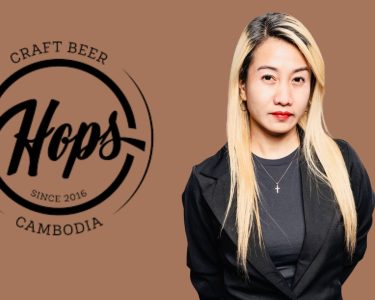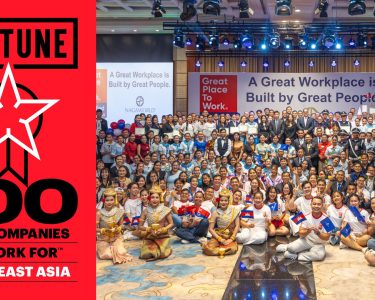Stew Post
Stew Post sat down with Eric Piras, founder of Cigraal and the award-winning Bertie Cigar Lounge, to discuss his decades of experience in the cigar industry and his latest venture in Cambodia. From opening markets to “democratising the image of the cigar,” Eric shares his journey of bringing a new cigar culture to Phnom Penh through Bertie’s unique atmosphere, partnerships, and educational approach.
Stew: You have decades of experience in the cigar industry, from leading international companies to establishing a world-renowned cigar lounge in Hong Kong. What was the motivation for expanding into Cambodia?
Eric: I started Cigraal – the parent company of Bertie – in 2015 after years of being Corporate Vice President of international sales for the market-leading cigar company.
Then, in 2019, I had the opportunity to open Bertie in Hong Kong, and we’ve been successful there. Last year, we were awarded the Best Cigar Lounge in Asia-Pacific by Cigar Journal. This was very encouraging: to show that if you work, you can get some results.
Last year I was thinking of expanding our retail in Asia-Pacific. Bertie in Hong Kong was doing well, as well as my company Cigraal: we are present in 27 countries in Asia-Pacific. My own cigar brand, Confidenciaal, is present in over 27 countries, with a presence in the Middle East, Africa, and Europe.
When I looked at Cambodia, I saw that the country is developing; and has quite a good framework for investment and operating a company. The use of the US dollar, the systems for capital transfer and tax on profit are all positives for us and the country is looking for investors into the country.
So, I decided to go ahead with operations in Cambodia!

Stew: Your first year in Phnom Penh seems to be going well, you’ve organised events and have developed a number of partnerships. What is your business model and how does it fit into the local landscape?
Eric: The success of Bertie in Hong Kong was in its atmosphere. Upon entering Bertie, people feel comfortable and at ease. In Chinese, it’s called “good feng shui”. It’s actually quite special, so we tried to replicate Bertie Hong Kong here: the same concept, the color, the DNA of the initial lounge.
We have atmosphere, wonderful service and the largest selection of cigars in Cambodia, with cigars from Honduras, Nicaragua, the Dominican Republic, and Cuba.
Cambodia is a market where many of the brands we sell were not present: Arturo Fuente, Joya de Nicaragua, Flor de Selva, Ashton, Matilde, Azan and Confidenciaal – my own brand. All the brands that I distribute, which are at a lower price point than cigars from Habanos (Cuba), are completely new to most. We opened a new market to new people, to people who want to try a new experience without breaking their pocket.
But more than just atmosphere, the aim of Bertie in Cambodia, like in Hong Kong, is to democratise the image of the cigar.
Stew: What do you mean by “democratise the image of the cigar”? Can you elaborate on this concept and how you achieve this?
Eric: When we opened in Hong Kong, the market was very much mature with Cuban brands: Cohiba, Trinidad, which cost an average of $100–$200 per cigar. Not everyone can afford $100 or $200 on a single cigar anywhere in the world, even in Europe or in the States.
So, we had this aim to democratise the cigar – in price but also in image. A lot of people still picture cigar smokers as a well-established man in a suit enjoying his cigar alone. Of course, this fits the profile of many clients, but we want to open the experience to everyone.
In Bertie Phnom Penh, we see young men and women coming in, they smoke one cigar (at $15 or $20), have a drink together, and they love to discover something different. A lot of them don’t want to smoke what their father smoked.
This is what we mean when we say democratise: when you walk into Bertie, it doesn’t matter if you’re a man or woman, a westerner or a Cambodian, younger or older: you are considered the same way.
This is also why we have been working on our masterclasses and educational events.

Stew: How do your masterclasses support the democratisation of cigars? Can you talk a bit about these educational events?
Eric: Of course. We do masterclasses by appointment. If you have five or six friends and you want to have a small party and learn about cigars, you can contact us and we’ll arrange it.
We go through the whole history of cigars and the process of producing them, from the quality of the seeds and importance of the soil in which the tobacco is grown, to the different types of leaves that make a good cigar. It takes two to three years to make a cigar, from plant to box. Not everyone knows that.
So, we do these trainings with our guests and our staff, but also with the bars, hotels, and restaurants that purchase their cigars from us. It is important to train them on these subjects, so they are more knowledgeable when serving their own clients.
When people understand cigars, how they are made, and what makes them special, they can see that it is not something that is only for the wealthy businessman.
And it’s the same with our lounge. The idea is really that there’s no snobbism: you can walk into Bertie and the staff will not just immediately direct you to the most expensive cigar. What they want to know is how much time you have. Are you a big cigar smoker? Is this your first cigar?
We have something for everyone, and we want to make sure everyone feels welcome and learns to enjoy a cigar with us.
Stew: Besides Bertie’s atmosphere and the idea of democratising cigars, what has your strategy been to build a customer base and grow the business in Cambodia?
Eric: We are still new, so building a clientele is our main task. And so far, every month we have new customers, new people coming in. Word of mouth has also been very important. We have a lot of people who come on a regular basis, they invite some friends and these friends come back. So, we have grown our customer base according to this word of mouth, with positive customer experience built on good service and a good selection.
We have also been holding events: indoor events at Bertie, outdoor events, and events organised with partners. These have been very helpful in building our clientele.
We’ve partnered with Samai Rum, Moonshine Spirits, The Warehouse and other wines & spirits suppliers for events that have been quite successful. I was actually very surprised by the success of the cooperation we’ve had with them, and the events we’ve coordinated together. We’ll be looking forward to continuing this collaboration.
We also held an event at Naga World 2, where the focus was on luxury brands: tailor-made shoes, fine wine, top-tier alcohol, everything. We had three exceptional days at Naga World 2 with a lot of VIPs in attendance. We also held masterclasses which went quite well. People wanted to learn more about the cigar, the association between whiskey and cigars.
We also participate in charity events where we donate to support important causes and the local community.

Stew: After decades in the business, what has kept your passion for cigars alive? Why do you want to share this experience with others?
Eric: For me, a cigar is much more than just the taste, though of course the different flavors are a big part of the experience. It’s really about the moment you create around it. Depending on the size of the cigar, you know you have 40 minutes, an hour, sometimes even an hour and a half ahead of you. That becomes your time. You can share it with friends, or you can simply enjoy it on your own. It’s a pause, a space to connect or disconnect, and that’s something I value.
What we’ve also had people tell us, especially when smoking a cigar after dinner, is that it changes the dynamic. Normally, when dinner ends, everyone says goodbye and heads home. But when a cigar comes out, people naturally stay together a little longer. Those extra 40 minutes lead to deeper conversations; you start talking about different things, getting to know each other better. Many people tell us, ‘If we hadn’t had a cigar, we wouldn’t have had this conversation.’ And that’s true.
That’s the beauty of the cigar experience. It’s not just about smoking. It’s about extending the moment, creating connections, and enjoying time that feels a little more meaningful.





